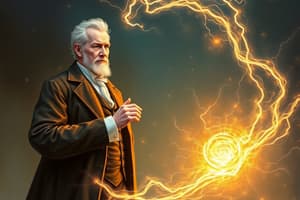Podcast
Questions and Answers
What did the study of electrical discharge in partially evacuated tubes in the mid-1850s lead to?
What did the study of electrical discharge in partially evacuated tubes in the mid-1850s lead to?
- Discovery of X-rays
- Discovery of alpha particles
- Discovery of gamma rays
- Discovery of cathode rays (correct)
What did Michael Faraday's experiments with electrolytes suggest?
What did Michael Faraday's experiments with electrolytes suggest?
- Electricity has a particulate nature (correct)
- Electricity is a continuous wave
- Electricity is not affected by chemical reactions
- Electricity can only flow through metals
What is a cathode ray tube made of?
What is a cathode ray tube made of?
- Glass and two thin metal electrodes (correct)
- Glass and one thick metal electrode
- Plastic and two thick metal electrodes
- Plastic and one thin metal electrode
At what conditions could the electrical discharge through gases in cathode ray tubes be observed?
At what conditions could the electrical discharge through gases in cathode ray tubes be observed?
What happens when a sufficiently high voltage is applied across the electrodes in a cathode ray tube?
What happens when a sufficiently high voltage is applied across the electrodes in a cathode ray tube?
What did Michael Faraday's experiments with electrolytes suggest?
What did Michael Faraday's experiments with electrolytes suggest?
What did the study of electrical discharge in partially evacuated tubes in the mid-1850s lead to?
What did the study of electrical discharge in partially evacuated tubes in the mid-1850s lead to?
What is the composition of a cathode ray tube?
What is the composition of a cathode ray tube?
What occurs when a sufficiently high voltage is applied across the electrodes in a cathode ray tube?
What occurs when a sufficiently high voltage is applied across the electrodes in a cathode ray tube?
What did the liberation and deposition of matter at the electrodes in Faraday's experiments indicate?
What did the liberation and deposition of matter at the electrodes in Faraday's experiments indicate?
Flashcards are hidden until you start studying
Study Notes
Electrical Discharge Studies
- Research in the mid-1850s on electrical discharges in partially evacuated tubes led to the development of gas discharge tubes, which were pivotal in understanding electric phenomena.
- Such studies contributed to the discovery of cathode rays and paved the way for advancements in vacuum technology.
Michael Faraday's Electrolyte Experiments
- Faraday's experiments with electrolytes suggested that electricity could induce chemical changes, demonstrating a direct relationship between electricity and chemical reactions.
- This indicated that elements could be reduced or oxidized by passing an electric current through them, laying the foundation for electrochemistry.
Composition of Cathode Ray Tubes
- A cathode ray tube (CRT) consists of a sealed glass envelope containing low-pressure gas and two electrodes: a cathode (negative) and an anode (positive).
- The inner surface of the tube is usually coated with phosphorescent material to display images when struck by cathode rays.
Conditions for Electrical Discharge in Gases
- Electrical discharge through gases in cathode ray tubes can be observed at low pressure, facilitating easier ionization of the gas.
- A strong electric field is required, generated by applying a high voltage across the electrodes, allowing electrons to flow and produce cathode rays.
High Voltage Application in Cathode Ray Tubes
- When a sufficiently high voltage is applied across the electrodes in a cathode ray tube, electrons are accelerated from the cathode to the anode.
- This movement generates cathode rays, which consist of streams of electrons, and can lead to visible light emission when they hit the phosphorescent coating.
Implications of Faraday's Observations
- The liberation and deposition of matter at the electrodes during Faraday's experiments indicated a connection between electrical current and physical changes at the molecular level, confirming the conservation of mass.
- The observed phenomena were crucial in advancing the understanding of how matter interacts with electricity, influencing subsequent research in both chemistry and physics.
Studying That Suits You
Use AI to generate personalized quizzes and flashcards to suit your learning preferences.




